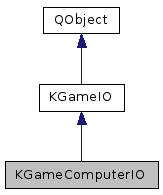libkdegames/libkdegamesprivate/kgame
#include <KGame/KGameIO>

Public Slots | |
| virtual void | advance () |
Signals | |
| void | signalReaction () |
 Signals inherited from KGameIO Signals inherited from KGameIO | |
| void | signalPrepareTurn (QDataStream &stream, bool turn, KGameIO *io, bool *send) |
Public Member Functions | |
| KGameComputerIO () | |
| KGameComputerIO (KPlayer *player) | |
| ~KGameComputerIO () | |
| void | pause (int calls=-1) |
| int | reactionPeriod () const |
| int | rtti () const |
| void | setAdvancePeriod (int ms) |
| void | setReactionPeriod (int advanceCalls) |
| void | stopAdvancePeriod () |
| void | unpause () |
 Public Member Functions inherited from KGameIO Public Member Functions inherited from KGameIO | |
| KGameIO () | |
| KGameIO (KPlayer *) | |
| virtual | ~KGameIO () |
| void | Debug () |
| KGame * | game () const |
| virtual void | initIO (KPlayer *p) |
| virtual void | notifyTurn (bool b) |
| KPlayer * | player () const |
| bool | sendInput (QDataStream &stream, bool transmit=true, quint32 sender=0) |
| void | setPlayer (KPlayer *p) |
Protected Member Functions | |
| virtual void | reaction () |
Additional Inherited Members | |
 Public Types inherited from KGameIO Public Types inherited from KGameIO | |
| enum | IOMode { GenericIO =1, KeyIO =2, MouseIO =4, ProcessIO =8, ComputerIO =16 } |
Detailed Description
KGameIO variant for real-time games.
The KGameComputerIO class. It is used to create a LOCAL computer player and communicate transparently with it. Question: Is this needed or is it overwritten anyway for a real game?
You most probably don't want to use this if you want to design a turn based game/player. You'll rather use KGameIO directly, i.e. subclass it yourself. You just need to use KGameIO::signalPrepareTurn and/or KGameIO::notifyTurn there.
This is rather meant to be of use in real time games.
Constructor & Destructor Documentation
| KGameComputerIO::KGameComputerIO | ( | ) |
Creates a LOCAL computer player.
Definition at line 499 of file kgameio.cpp.
| KGameComputerIO::KGameComputerIO | ( | KPlayer * | player | ) |
Definition at line 504 of file kgameio.cpp.
| KGameComputerIO::~KGameComputerIO | ( | ) |
Definition at line 509 of file kgameio.cpp.
Member Function Documentation
|
virtualslot |
Works kind of similar to QCanvas::advance.
Increase the internal advance counter. If reactionPeriod is reached the counter is set back to 0 and signalReaction is emitted. This is when the player is meant to do something (move its units or so).
This is very useful if you use QCanvas as you can use this in your QCanvas::advance call. The advantage is that if you change the speed of the game (i.e. change QCanvas::setAdvancePeriod) the computer player gets slower as well.
If you don't use QCanvas you can use setAdvancePeriod to get the same result. Alternatively you can just use a QTimer.
Definition at line 560 of file kgameio.cpp.
| void KGameComputerIO::pause | ( | int | calls = -1 | ) |
Ignore calls number of advance calls.
if calls is -1 then all following advance calls are ignored until unpause is called.
This simply prevents the internal advance counter to be increased.
You may want to use this to emulate a "thinking" computer player. Note that this means if you increase the advance period (see setAdvancePeriod), i.e. if you change the speed of your game, your computer player thinks "faster".
- Parameters
-
calls Number of advance calls to be ignored
Definition at line 550 of file kgameio.cpp.
|
protectedvirtual |
Default implementation simply emits signalReaction.
Definition at line 579 of file kgameio.cpp.
| int KGameComputerIO::reactionPeriod | ( | ) | const |
Definition at line 528 of file kgameio.cpp.
|
virtual |
Run time idendification.
Predefined values are from IOMode You MUST overwrite this in derived classes!
- Returns
- rtti value
Implements KGameIO.
Definition at line 518 of file kgameio.cpp.
| void KGameComputerIO::setAdvancePeriod | ( | int | ms | ) |
Start a QTimer which calls advance every ms milli seconds.
Definition at line 533 of file kgameio.cpp.
| void KGameComputerIO::setReactionPeriod | ( | int | advanceCalls | ) |
The number of advance calls until the player (or rather: the IO) does something (default: 1).
Definition at line 523 of file kgameio.cpp.
|
signal |
This signal is emitted when your computer player is meant to do something, or better is meant to be allowed to do something.
| void KGameComputerIO::stopAdvancePeriod | ( | ) |
Definition at line 541 of file kgameio.cpp.
| void KGameComputerIO::unpause | ( | ) |
Equivalent to pause(0).
Immediately continue to increase the internal advance counter.
Definition at line 555 of file kgameio.cpp.
The documentation for this class was generated from the following files:
Documentation copyright © 1996-2014 The KDE developers.
Generated on Tue Oct 14 2014 22:44:48 by doxygen 1.8.7 written by Dimitri van Heesch, © 1997-2006
KDE's Doxygen guidelines are available online.
 KDE API Reference
KDE API Reference